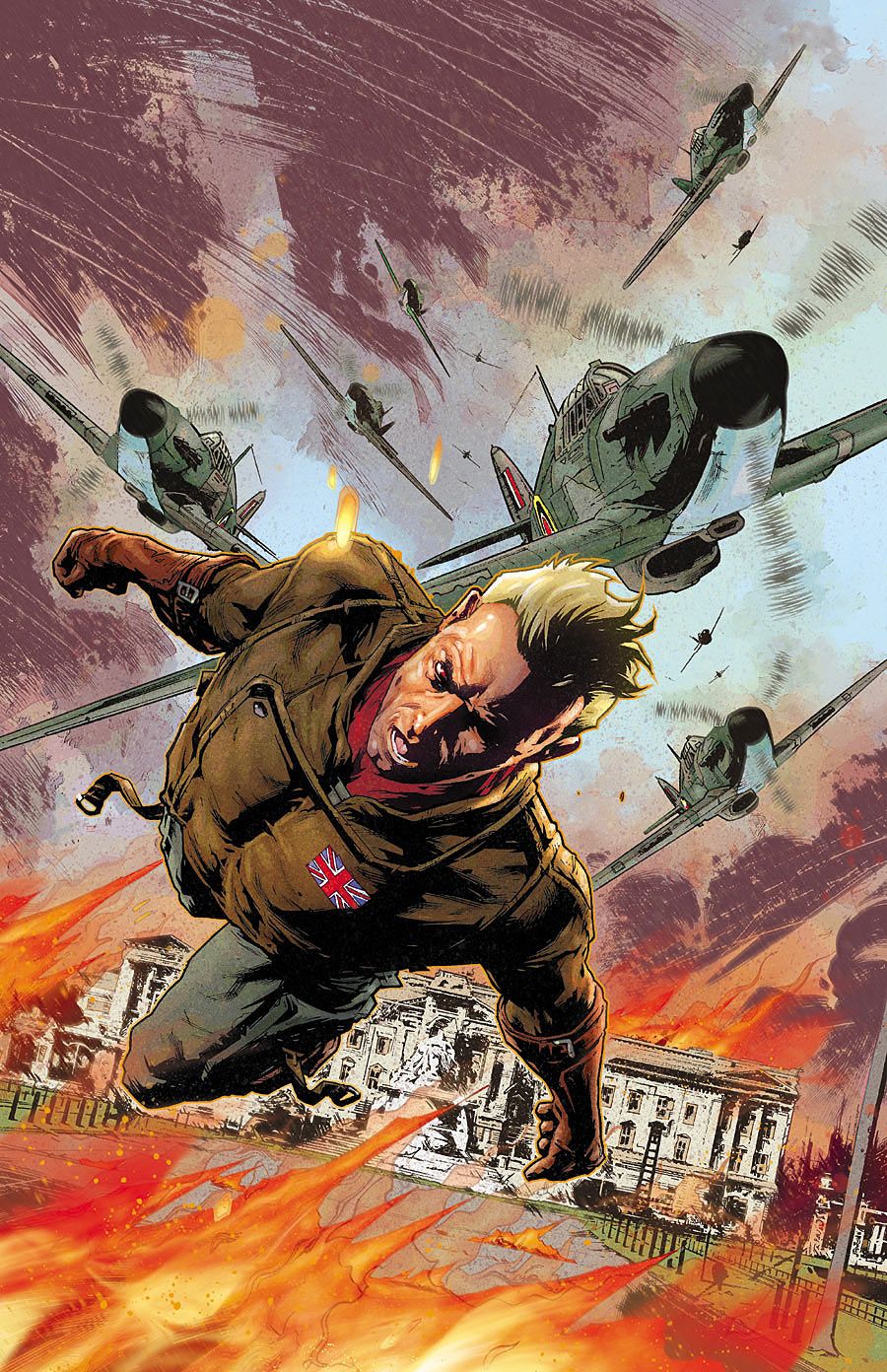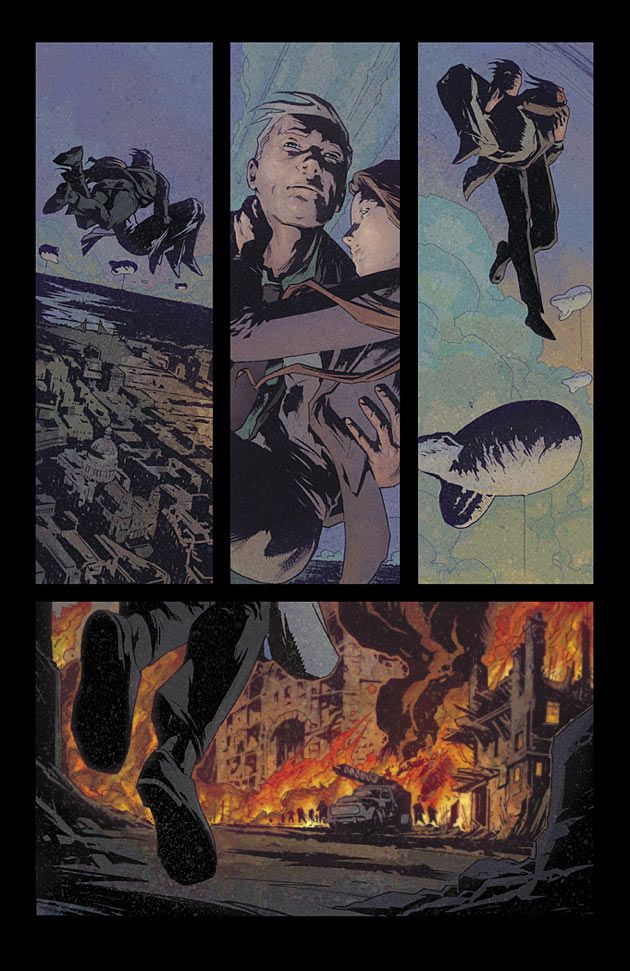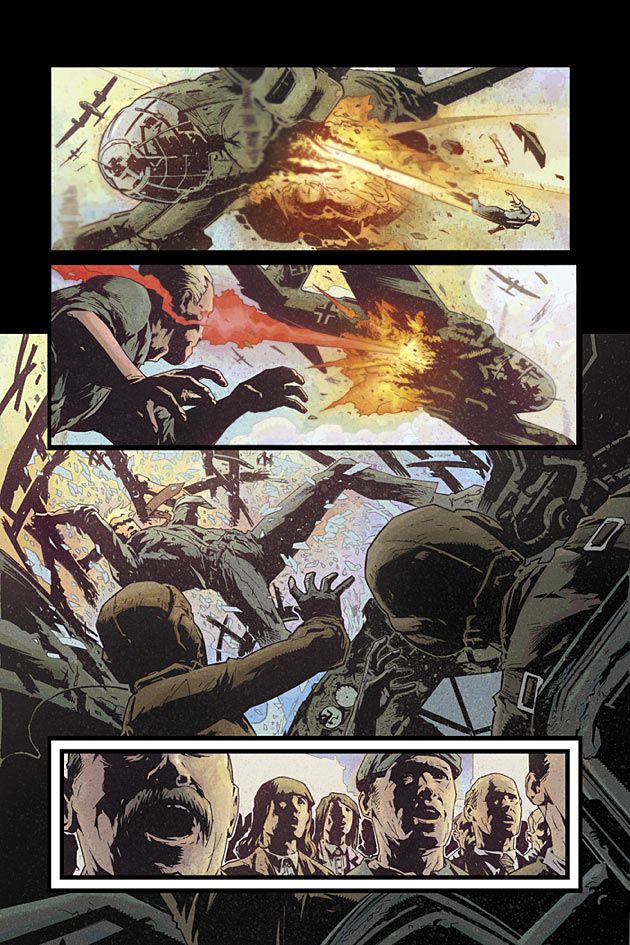These days, it's not uncommon for both British and American audiences to track the lives of the UK's royal family through their most minute details. But a new project from DC Comics' Vertigo imprint explores the possibilities of a monarchy with real power -- real superpowers, that is.
In "The Royals: Masters of War," writer Rob Williams and artist Simon Coleby team for an alternate take on World War II where the royalty of the world are blessed with divine superpowers and cursed with celebrity indifference. When one young member of the British monarchy decides to enter the growing war in Europe, it sets off a chain reaction that takes himself and his siblings to the front of the biggest battles of the era from Pearl Harbor to Stalingrad.
Known for their collaborations on "2000 A.D." titles including last year's acclaimed "Trifecta" crossover, Williams and Coleby are switching up their style for "The Royals" with a focus on historical accuracy and massive widescreen action. CBR News spoke with the writer about the project in advance of the pair's appearance at this weekend's Thought Bubble convention in Leeds, and below, Williams describes the way their collaboration grew to such a bombastic undertaking, his thoughts on royals both fictional and real, the challenges of portraying World War II accurately and more.
CBR News: Rob, when I saw the announcement for "The Royals," my first thought was you watching the news of the new royal baby and thinking, "I wonder if that baby could blow up buildings." [Laughter] But if not that, what was the actual origin for this project?
Rob Williams: Who among us has not thought at one point, "I wonder if that baby could blow up buildings"? But the origins of this idea is a good question. There's a thing here in the UK called the House of Lords, which is sort of a higher political effete than Parliament, and they're all old fuddy duddies. And I think originally I had the idea of "What if they all had superpowers?" That ties into the class thing and one whole strata of society looking down on another. So it would make sense that they were superpowered.
But I realized that was a little bit obscure for an American market, but it was no stretch to apply that same idea to the royal family. Everyone loves the royal family! [Laughs] And if you go back through history, you see the fact that there was a belief about royalty from around the world that they were given to us by God. These were high beings. That was the belief then, so it was pretty easy to take that "chosen by God" brand and give it special abilities. I like the idea that the purer their bloodline, the more powerful they are. That explains a lot of things that have been whispered about the royal family over the years about inbreeding and the like. That would make sense for them to do because everyone wants to keep the family in power literally.
The whole idea here is about taking power and holding power while taking an extra step in spectacle where you've got large buildings blowing up, just as you suggested.
In some ways, this feels like a kind of b-side to your breakout series "Cla$$war," which explore a similar superhero idea from an American perspective.
I think there are similar themes to "Cla$$war." This whole class structure idea is there, and when we open our story it's World War II as we remember it. But the difference here is that the royals around the world have had a treaty in place for a long time where they don't get involved in any wars. Wars are what the little people do. They fight the wars while the royals sit back in their fantastic houses eating the best food and drinking the best wine. Why should they get involved for a cause? The world is a lovely place for them. So there are certainly class themes in that.
Williams Drafts RM Guera for "Judge Dredd: The Man Comes Around"
And a lot of the action is probably the closest thing I've done to "Cla$$war" which was about eleven years ago now. It's big scale action with huge set pieces, and when things go "Boom," they really go "BOOM." This book uses double-page spread destruction in a way that you don't see too often. But at its heart as well, the mantra I had writing this book was "It's about a family." This is about the trials and tribulations of a real family, and I had to keep reminding myself of that because occasionally the scale of the whole thing against World War II could be quite intimidating. But you just have to say, "It's about the characters." That's the important thing, I think.
That World War II setting does separate this from your previous work, and you seem to be really embracing the period trappings of "The Royals." Each issue will be focused on one specific battle from the way. What advantage does that focus give to the story?
I'm just naturally interested in the era. From a technical point of view, Simon Coleby and I are both huge plane nuts. We did a lot of research -- partly out of respect for the fact that we're telling a story where an awful lot of people from within our own living memory died. If we're doing that, we want to do it right. But also, as a reader it drives me crazy if an artist has drawn a particular airplane and hasn't got it right. God, that's nerdy. [Laughs]
But Simon and I have agreed that part of the thrill of this book should not just be the aircraft but also the buildings and the ships and the way people dress. We want to put people right into this world, and I've put a lot of work into the research. My scripts have an awful lot of reference for Simon, and he looked up a huge amount of reference as well. I think after that, he said, "I'll never do a period book ever again." [Laughs] But you can see in his pages that he's done this right. The particular aircraft look like the aircraft, and I think it's just an amazing looking book. It's not a thing where we're saying, "Oh, it's set in World War II. Don't worry about it." We're really putting you in there, and we've really enjoyed that.
As for the structural thing with the battles, we skip forward a year in time with each issue. We leave the characters and come back to them, and there's been major progression. But the major emotional beats of the story take place against the backdrop of these famous battles. They're the key moments in the war.
Speaking of characters, I know that this series focuses on an imagined British royal family. Is there a particular character who provides the reader's point of view for the whole series?
We've got three siblings who are the main three characters. My favorite character by far is Arthur, the Prince of Whales, who is the oldest brother. He's a complete asshole, for want of a better way to put it. He's an alcoholic, he's a hedonist, and he believes in nothing and will fight for nothing. So he gets dragged into this against his will. He'd be quite happy to sit this whole thing out, so he brings a more sarcastic, sardonic edge to the story.
But he's dragged in by his younger, idealistic brother, Henry, who is really our protagonist. Henry is the one who doesn't just drag his family into World War II. He drags all the royal families in. Because once the British royals get involved, the truce is off, and it's open season. And he's just trying to do good. He's at home in Buckingham Palace when we first meet him, and the Germans are bombing London. Every day he sees the bombers go over, and he sees the fires in the East End of London. And he cares. He actually cares about the people, which is what makes him stand up. But when he tries to do the right thing, he learns that there are far more powerful royals around the world. In Japan, there's the emperor Jimmu. He's the original emperor of Japan, and he's immortal, and suddenly he's into this conflict too. The whole thing escalates out of proportion.
The third sibling in our group is Rose, Arthur and Henry's sister. She's a telepath, and she's a good person, too. But the difficulty that Henry and Rose have is that they're in love with one another even though they're siblings. This is something that goes back in the royal family, and they can never do anything about it. It's adds a sort of tragic tension to the story. But basically, these three siblings get turned into superheroes for PR purposes because they turn back the tide initially. But then they have to go off to America because Britain needs America to enter the war, but as was historically true, they hadn't gotten involved at that point. In issue #2, we see these three as celebrities who are on posters everywhere, and they're facing a test of how much America loves them. Because Americans love the royal family, as we know. They may love the royals more than Britain! [Laughter]
Visually, this is a change from your previous collaboration with Simon, and it's the first work with Vertigo for both of you. How has that partnership changed with those circumstances?
The way that Simon and I's relationship has progressed through this book is that he's no longer talking to me. [Laughs] That's a bit of an exaggeration! Simon is fantastic. We've worked together for several years now, but most of what we've done has been set in the world of Judge Dredd, which is a futuristic setting. That's great because it allows Simon to draw very imaginative backgrounds, but this is very different, as I said, because we wanted everything in "Royals" to be based in reality. So I think he put a lot more work into it as we went through. He really put his heart and soul into it -- not that he hasn't in other books, but there are no shortcuts here once you've committed to using the reference. I think it really shows in the end. We've shown pages from this to friends at comic conventions, and there are some really top artists who have been blown away by it.
That's how we brought this to Vertigo, actually. We were at the Kapow! convention, and Simon had his portfolio. He showed it to Will Dennis from Vertigo, and fortunately for us, Will absolutely loved it. I think that's what sold it much more so than the pitch. It was the visual quality. Like I said, we've got some huge double-page spreads here, and it's impossible not to look at them and go, "Whoa!" And we're delighted this is at Vertigo. I've been reading their comics since "Sandman" and "Hellblazer" in the early days, so it's a thrill.
Overall, what kind of statement do you hope "The Royals: Masters of War" makes about the connection between monarchy and everyday people?
To be frank, I think most British people feel the same way about the royals: they're celebrities. They're not our rulers as was the case for hundreds and hundreds of years. People see them as just that, and I think there are still some of the older generation in the UK who have a large amount of respect for them, but mostly we're just fascinated by them. There are times when whispers get out and stories break about them, and it's a soap opera. I think people are more amused by it than anything. But even then, you get the impression that some of them are good people who care about things. Prince Charles will speak out about social issues occasionally, and that's a good thing to see them do considering how much of our taxpayers money they get to keep. So it's a weird relationship. Some people are very much against them, but most of us just like to read about them in the tabloids. So this is another story like that, only we've given them superpowers!
"The Royals: Masters of War" debuts from Vertigo this February.





